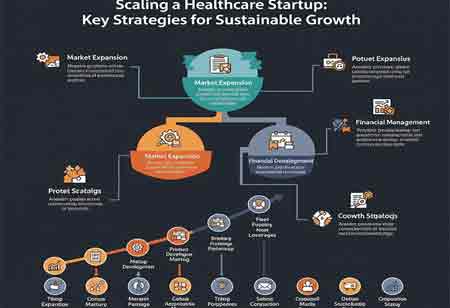Thank you for Subscribing to Healthcare Business Review Weekly Brief
Be first to read the latest tech news, Industry Leader's Insights, and CIO interviews of medium and large enterprises exclusively from Healthcare Business Review
Scaling a healthcare startup: Key strategies for sustainable growth
Healthcare startups must navigate a rapidly evolving landscape by focusing on innovation, strategic partnerships, strong financial management, and understanding patient needs to achieve sustainable growth amidst rising costs and workforce challenges.

By
Healthcare Business Review | Monday, June 02, 2025
Stay ahead of the industry with exclusive feature stories on the top companies, expert insights and the latest news delivered straight to your inbox. Subscribe today.
Fremont, CA: The healthcare industry is undergoing a rapid transformation, driven by technological advancements, evolving patient expectations, and a regulatory landscape. For healthcare startups, scaling sustainably in this environment requires a multi-faceted approach, focusing on innovation, strategic partnerships, robust financial management, and a deep understanding of patient needs.
The Evolving Healthcare Landscape
The current and near-future healthcare landscape presents a mix of opportunities and challenges for startups seeking to make an impact. Escalating operational costs—particularly labor-related expenses—are putting financial pressure on healthcare organizations. This presents a significant responsibility for startups to demonstrate clear value and cost-effectiveness, thereby alleviating this pressure. At the same time, the sector is facing critical workforce shortages and widespread burnout among healthcare professionals, increasing the demand for solutions that enhance efficiency, automate routine tasks, and support overburdened staff. Cybersecurity has also emerged as a top priority, with healthcare organizations becoming prime targets for cyberattacks—the average cost of a data breach in the sector reached $9.77 million in the previous years, underscoring the premium placed on startups with strong data protection capabilities.
Key Strategies for Sustainable Growth
Healthcare startups must implement comprehensive strategies to achieve sustainable growth in the digital health sector. These strategies include harnessing the power of digital health and AI, strategic partnerships and collaborations, securing funding and financial sustainability, navigating the regulatory landscape, prioritizing patient engagement and experience, building a strong team and culture, and fostering a culture of accountability.
The potential of AI-driven innovation is boundless for healthcare technology solutions, revolutionizing automated administrative tasks, predictive analytics, clinical support, medical diagnostics, virtual care, remote patient monitoring (RPM), wearable medical devices, and integrated digital health platforms. Collaborations with healthcare systems, biopharmaceutical companies, tech giants, and data providers, as well as cross-sector partnerships, are crucial for growth and market penetration.
Securing funding and financial sustainability is not just important; and it's a lifeline for healthcare startups. With AI-driven investment, direct-to-consumer models, an early-stage focus, patient capital, a long-term vision, and IPO activity driving dealmaking, startups must demonstrate strong value propositions and robust clinical validation to attract investors.
Compliance is not just a requirement; it's a strategic advantage in healthcare startups, ensuring robust cybersecurity measures, understanding evolving regulations, compliance-focused tools, and a culture of accountability. Patient-centricity is at the core of sustainable growth, with personalized communication, omnichannel experiences, real-time interactions, self-service tools, patient education, and feedback mechanisms.
Scaling a healthcare startup is a complex undertaking that requires a strategic blend of technological innovation, astute financial management, a deep understanding of the regulatory environment, and an unwavering focus on patient care. By embracing AI and digital health, and most importantly, by forging strategic partnerships, navigating funding landscapes effectively, prioritizing compliance, and putting patient engagement at the forefront, healthcare startups can not only survive but grow, contributing to a more efficient, accessible, and patient-centric future of healthcare.






